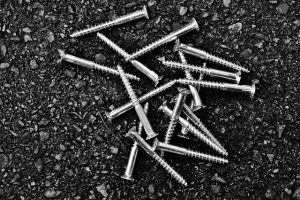
Screws are often plated with zinc or galvanized to protect against corrosion. Technically speaking, galvanized screws feature a protective zinc shell as well. Because of the similarities between them, many people assume that galvanized screws and zinc-plated screws are the same. While they both feature a protective zinc shell, though, they each involve a different method.
What Are Galvanized Screws?
Galvanized screws are characterized by the presence of a protective zinc shell that’s achieved by submerging the screws in molten zinc. Known as hot-tip galvanizing, this finishing process adds a layer of zinc over the surface of a screw. When a screw is galvanized, it’s submerged inside a container filled with molten zinc. After soaking in the molten zinc for an adequate amount of time, the screw is removed and allowed to cool. As the screw cools, the molten zinc hardens, thereby forming a shell on the screw’s exterior.
What Are Zinc-Plated Screws?
Like galvanized screws, zinc-plated screws feature a protective outer layer of zinc. Instead of dipping the screws in molten zinc, though, it involves a completely different method. Zinc-plating is a finishing process that relies on electricity to create a protective layer of zinc on the surface of a workpiece, or in this case, a screw. Basically, the screw is placed inside a container filled with water, saline and a zinc anode. Next, an electrical current is applied to the solution. The electrical current causes the zinc ions to bond with the screw, resulting in the formation of a protective zinc shell similar to that created with galvanization.
Corrosion Protection
Both galvanization and zinc-plating offer a high level of protection against corrosion. Screws, of course, are typically made of metals and alloys, some of which include steel, aluminum and brass. Unfortunately, all of these metals and alloys are vulnerable to corrosion. When a screw is exposed to moisture and oxygen, it may undergo oxidation, thus corroding.
How exactly does zinc protect screws from corrosion? Well, zinc can still corrode, but it corrodes at a significantly slower rate than other metals and alloys. When compared to steel, for example, zinc corrodes about 30 times more slowly. Therefore, zinc serves as a protective barrier for screws. Whether a screw is galvanized or zinc-plated, it will feature a zinc shell. And because the zinc covers the screw’s entire exterior, the actual metal from which the screw is made won’t be exposed to moisture or oxygen.
